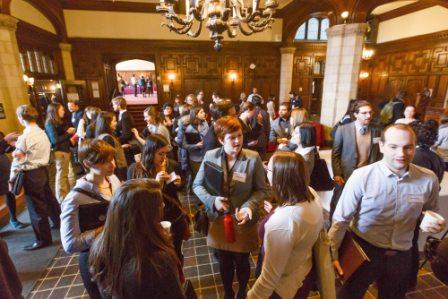
Searching the word “professionalize” in Google images leads to some pretty abstract, random stuff: mountains, schoolchildren, businessy-looking people in suits, even cats. Professionalization can often feel like a vague, abstract task–one that you’re unsure how to go about doing, but one that seems expected of you.
As in, MAPH expects it of you. A large part of MAPH’s work in developing better thinkers, writers, and humanists is helping students conquer the professional world–or at least, helping students look astutely at application materials, get a handle on job markets, and think about how the humanities work both within and outside of the academy.
Luckily, your journey into professionalism in MAPH doesn’t have to be confusing and daunting. In MAPH land, professionalization means developing your skills, experience, and connections, and being able to write and talk about those things in compelling and interesting ways.

Professionalization doesn’t have to be this creepy, I promise.
WHY YOU SHOULD CARE:
1. You are thinking of working after MAPH.
It takes an average of 3-6 months to get a job, sometimes longer depending on the industry. If you do the math, that means ideally you’ll start applying for jobs in Winter Quarter (you know, 2 months from now). Unfortunately, Winter Quarter is the busiest time of the MAPH year–3 classes, a thesis, IT’S SO COLD OUTSIDE. Getting your resume in shape now cannot possibly be a bad idea.
2. You are thinking of doing a PhD after MAPH.

Doing a PhD involves (much!) more than just reading in awesome libraries.
Great! What are you doing to do between MAPH and your PhD? What if you want to take more than one year off? What are you going to do after your PhD? How are you going to set yourself up to survive a truly rough academic job market? What if you want to have a really interesting job to supplement your meager PhD stipend? Answer: start professionalizing now.
3. You have no idea what you want to do after MAPH.
Better to come up with a back up plan which involves making money (terrifying thought: your student loans will start being due in a year) until you do have a plan. Besides, the more research you do now, the more people that you meet, the better sense you’ll have of what you do want to do, whether it’s a career or another degree.
(Totally lost about what to do after MAPH? Conveniently, we have many alumni profiles on AfterMAPH! You can also come talk to your mentors.)
WHAT YOU CAN DO:
1. Attend events. There are lots.
- Talk with CHF‘s Matti Bunzel about work in the humanities on October 16 at 2 pm. (I’m super pumped about this!)
- November is Masters Student Month, rife with events to help you be a young, savvy professional. You’ll be able to find updates at the Graduate Student Affairs website.
- November 6 at 5:30 pm, MAPH will host its Alumni Night, a series of panels featuring various careers and degrees after MAPH.
- GradUCon is January 24, 2014. Put it on your calendar now. It’s a day-long professionalization extravaganza put on by Graduate Student Affairs, including resume help, networking, job panels, and as always, food and drink.
![]()
GradUCon 2013. Networking woah.
2. Make connections.
Whether that’s going on informational interviews (most formal) or chatting with MAPH alums at Social Hour (least formal), getting to know lots of people is invaluable. Sad to say, but most jobs/positions will come to your attention through people you know, and you are far more likely to get an interview if you know the people doing the interviewing. Because, you know, they know you.
3. Look for positions now.
Even if you’re not applying (quite yet), you’ll get a sense of what kinds of things are available, where to look, who to talk to, what positions sound most exciting. You will thank yourself A LOT if you do the initial, stressful, researching work of applications slowly but early, rather than in April. Don’t wait until April. That’s when your thesis is due. Do you really want to be applying for jobs while finishing your thesis? No, no you don’t.
4. Whew! Take a breath.

This kitten has decided that it most enjoys being Pikachu.
Take time to think about what you really enjoy doing. During my MAPH year I discovered that while I love doing research, I’m much happier being in the classroom teaching. While doing grant-writing this summer, I discovered that while I may be good at writing, working on grants felt stressful and unrewarding compared to how I felt actually talking to people from other non-profits. Taking a breather and being honest about what you really like/dislike will help you think about professions/positions that you’ll be happy doing.
ERMIGERSH I AM SO CONFUS WHAT DO I DO? (RESOURCES)
Career Advancement – Advisers, Job Listings, Workshops, and More
THE MENTORS! Keri, Tavi, and Jessi are here to help with resumes, cover letters, interviews, and general life advice. Also we know lots of people and organizations.
Relevant Coursework – Classes like Teaching in the Community College, What are the Humanities For?, and Cultural Policy courses all have elements of professionalization incorporated into the coursework.
Job Search Engines:

Bam. Professionalization. It’s a lot, but it’s not nearly as impossible as it seems.
